#lots of adventures and high stakes
Note
Another question. You said in an old ask that Sun, Moon, and Eclipse "actually started off all running the same ship, but they came to disagree on what they wanted to do overtime so Eclipse struck out on his own." Was this disagreement a big blow-out fight or just a "we'll agree to disagree" kinda deal? And what was it about exactly?
It was a big Blow out kind of fight
The boys had a very big disagreement about continuing treasure hunting
After Eclipse lost his eye Sun and Moon were insistent it was too dangerous and not worth the risk, while Eclipse firmly believed the reward outweighed the risk and that they all knew what they were getting into when they all set out
#sun and moon tried to convince him that being pirates would be just as good#still plenty of treasures and spoils#lots of adventures and high stakes#but it was never enough for Eclipse#he always wanted more treasure#more magical and dazzling trinkets#like he needed it more than anything else#Eclipse struck out on his own and never looked back#no matter how much he missed them#he regret it a lot over the years#and Sun and Moon still left his room just the same in case he ever decided to come back#i wonder why he wants special treasures so bad#how strange huh?#👀#askbox#ask starr#silent shanty#silent shanty au#eclipse#pirate eclipse#sundrop#pirate sun#moondrop#pirate moon
14 notes
·
View notes
Text
episode promo art by sam alden my beloved
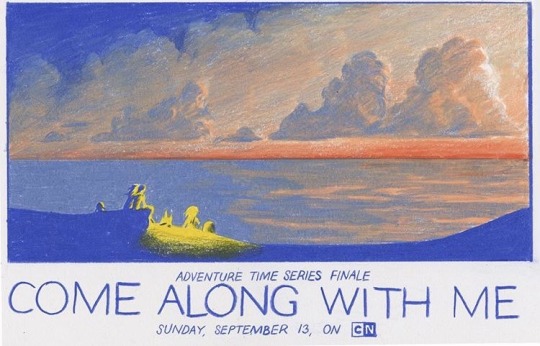
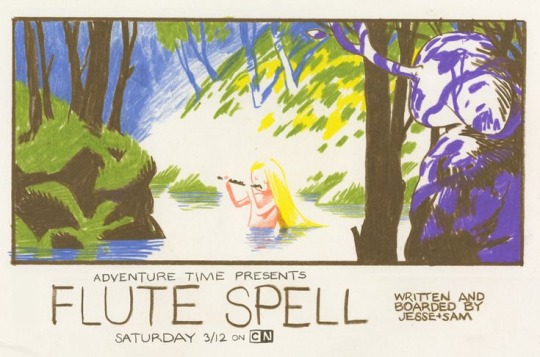
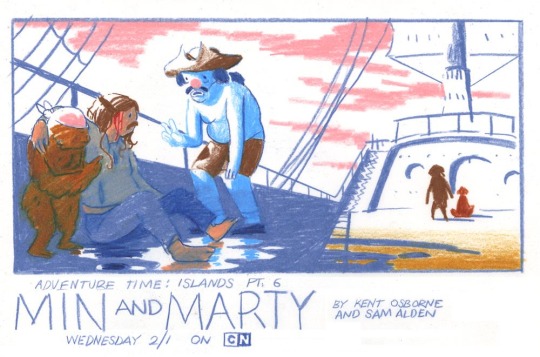

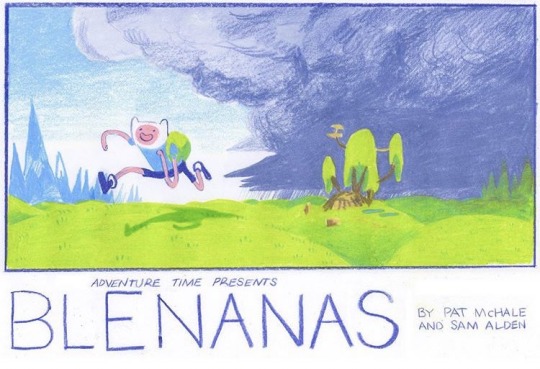


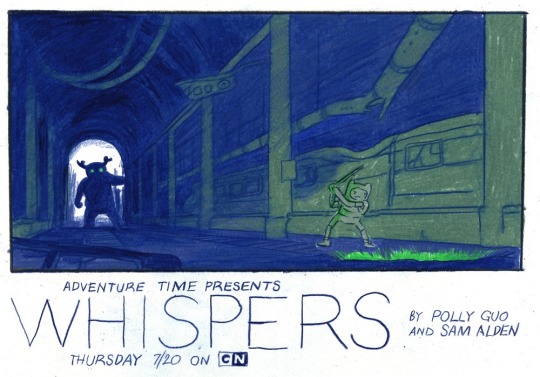
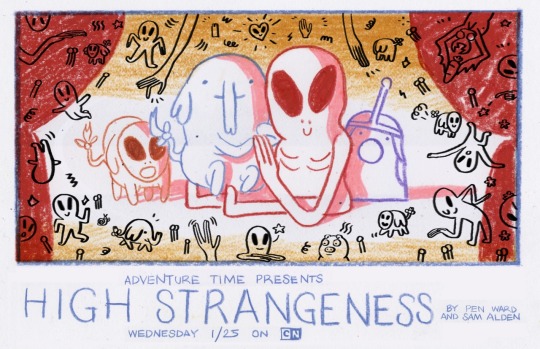

#adventure time#sam alden#promo art#finn the human#marceline#these are just a few there are a lot more#come along with me#CAWM#min & marty#high strangeness#flute spell#skyhooks#stakes miniseries#whispers#blenanas#the wild hunt#flute spell is my favorite btw#finntress#the invitation#at
4K notes
·
View notes
Text
Sonic 1: oh no sonic!
Sonic 2: oh no green hills
Sonic 3: OH NO EARTH
#sonic 2 spoilers#sonic the hegdehog#spiritgenie#sonic movie 2022#sonic movie#sonic 3#sonic adventure 2#sonic the hedgehog 2#sonic the hedgehog 3#I like how the stakes just jumped a lot between the first and second movie#like In the first we were worried about sonic being killed and dissected#then in the second we were worried about robotnic destroying green hills…#well more of him being power hungry and threatening to enslave the multiverse#could that be a high stake if he only said he would do it?#anyway and then the third movie will hopfully have an even higher stake with the earth at risk of being destroyed by a grieving grandfather#though his son who he altered the memory of to make him go on a suicide mission
26 notes
·
View notes
Text
i would kill to experience kh2 for the first time again
#idk like it hit harder than 1 and com imo#like the first one was like your typical adventure game you know?#like yeah shits bad and u gotta save the world but you dont really know anything and neither does sora so the stakes arent that bad#theyre high and bad but?? mot that bad?? bc you dont KNOW. you dont knqo the lore you dont understand the significance of anything#and com its like god damn shits bad and i felt really terrible for sora but again its like theres these new things you dont really understan#understand that dont hit as hard u til you play ahain after playing thru the series i think#like theres stuff you dont catch#but kh2 its like. idk how to explain it#i think maybe bc its not world ending stakes its more personal#you dont really know the orgs goals until nearly the very end i think and even then theyre mostly antagonistic TO sora specifically rather t#than the world in general#and i think its also the better characterizations of evwryone and their interactions it feels a lot more personal? so things hit harder#and it has very good payoff with sora finding riku in the end and also the soul tearing prologue 😭#idk how to explain it very well tbh it just hits different for me and i wosh i could experience it again#michi tag#the other games like bbs also hit hard but at the same time not really bc by then you know what to expect#2 and days established that this is the tone#its no longer fun adventures through worlds
3 notes
·
View notes
Text
“Humans in the loop” must detect the hardest-to-spot errors, at superhuman speed
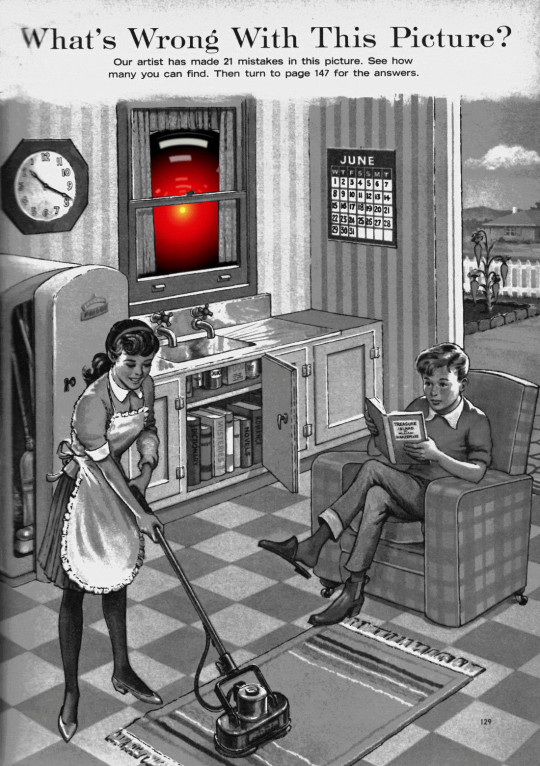
I'm touring my new, nationally bestselling novel The Bezzle! Catch me SATURDAY (Apr 27) in MARIN COUNTY, then Winnipeg (May 2), Calgary (May 3), Vancouver (May 4), and beyond!

If AI has a future (a big if), it will have to be economically viable. An industry can't spend 1,700% more on Nvidia chips than it earns indefinitely – not even with Nvidia being a principle investor in its largest customers:
https://news.ycombinator.com/item?id=39883571
A company that pays 0.36-1 cents/query for electricity and (scarce, fresh) water can't indefinitely give those queries away by the millions to people who are expected to revise those queries dozens of times before eliciting the perfect botshit rendition of "instructions for removing a grilled cheese sandwich from a VCR in the style of the King James Bible":
https://www.semianalysis.com/p/the-inference-cost-of-search-disruption
Eventually, the industry will have to uncover some mix of applications that will cover its operating costs, if only to keep the lights on in the face of investor disillusionment (this isn't optional – investor disillusionment is an inevitable part of every bubble).
Now, there are lots of low-stakes applications for AI that can run just fine on the current AI technology, despite its many – and seemingly inescapable - errors ("hallucinations"). People who use AI to generate illustrations of their D&D characters engaged in epic adventures from their previous gaming session don't care about the odd extra finger. If the chatbot powering a tourist's automatic text-to-translation-to-speech phone tool gets a few words wrong, it's still much better than the alternative of speaking slowly and loudly in your own language while making emphatic hand-gestures.
There are lots of these applications, and many of the people who benefit from them would doubtless pay something for them. The problem – from an AI company's perspective – is that these aren't just low-stakes, they're also low-value. Their users would pay something for them, but not very much.
For AI to keep its servers on through the coming trough of disillusionment, it will have to locate high-value applications, too. Economically speaking, the function of low-value applications is to soak up excess capacity and produce value at the margins after the high-value applications pay the bills. Low-value applications are a side-dish, like the coach seats on an airplane whose total operating expenses are paid by the business class passengers up front. Without the principle income from high-value applications, the servers shut down, and the low-value applications disappear:
https://locusmag.com/2023/12/commentary-cory-doctorow-what-kind-of-bubble-is-ai/
Now, there are lots of high-value applications the AI industry has identified for its products. Broadly speaking, these high-value applications share the same problem: they are all high-stakes, which means they are very sensitive to errors. Mistakes made by apps that produce code, drive cars, or identify cancerous masses on chest X-rays are extremely consequential.
Some businesses may be insensitive to those consequences. Air Canada replaced its human customer service staff with chatbots that just lied to passengers, stealing hundreds of dollars from them in the process. But the process for getting your money back after you are defrauded by Air Canada's chatbot is so onerous that only one passenger has bothered to go through it, spending ten weeks exhausting all of Air Canada's internal review mechanisms before fighting his case for weeks more at the regulator:
https://bc.ctvnews.ca/air-canada-s-chatbot-gave-a-b-c-man-the-wrong-information-now-the-airline-has-to-pay-for-the-mistake-1.6769454
There's never just one ant. If this guy was defrauded by an AC chatbot, so were hundreds or thousands of other fliers. Air Canada doesn't have to pay them back. Air Canada is tacitly asserting that, as the country's flagship carrier and near-monopolist, it is too big to fail and too big to jail, which means it's too big to care.
Air Canada shows that for some business customers, AI doesn't need to be able to do a worker's job in order to be a smart purchase: a chatbot can replace a worker, fail to their worker's job, and still save the company money on balance.
I can't predict whether the world's sociopathic monopolists are numerous and powerful enough to keep the lights on for AI companies through leases for automation systems that let them commit consequence-free free fraud by replacing workers with chatbots that serve as moral crumple-zones for furious customers:
https://www.sciencedirect.com/science/article/abs/pii/S0747563219304029
But even stipulating that this is sufficient, it's intrinsically unstable. Anything that can't go on forever eventually stops, and the mass replacement of humans with high-speed fraud software seems likely to stoke the already blazing furnace of modern antitrust:
https://www.eff.org/de/deeplinks/2021/08/party-its-1979-og-antitrust-back-baby
Of course, the AI companies have their own answer to this conundrum. A high-stakes/high-value customer can still fire workers and replace them with AI – they just need to hire fewer, cheaper workers to supervise the AI and monitor it for "hallucinations." This is called the "human in the loop" solution.
The human in the loop story has some glaring holes. From a worker's perspective, serving as the human in the loop in a scheme that cuts wage bills through AI is a nightmare – the worst possible kind of automation.
Let's pause for a little detour through automation theory here. Automation can augment a worker. We can call this a "centaur" – the worker offloads a repetitive task, or one that requires a high degree of vigilance, or (worst of all) both. They're a human head on a robot body (hence "centaur"). Think of the sensor/vision system in your car that beeps if you activate your turn-signal while a car is in your blind spot. You're in charge, but you're getting a second opinion from the robot.
Likewise, consider an AI tool that double-checks a radiologist's diagnosis of your chest X-ray and suggests a second look when its assessment doesn't match the radiologist's. Again, the human is in charge, but the robot is serving as a backstop and helpmeet, using its inexhaustible robotic vigilance to augment human skill.
That's centaurs. They're the good automation. Then there's the bad automation: the reverse-centaur, when the human is used to augment the robot.
Amazon warehouse pickers stand in one place while robotic shelving units trundle up to them at speed; then, the haptic bracelets shackled around their wrists buzz at them, directing them pick up specific items and move them to a basket, while a third automation system penalizes them for taking toilet breaks or even just walking around and shaking out their limbs to avoid a repetitive strain injury. This is a robotic head using a human body – and destroying it in the process.
An AI-assisted radiologist processes fewer chest X-rays every day, costing their employer more, on top of the cost of the AI. That's not what AI companies are selling. They're offering hospitals the power to create reverse centaurs: radiologist-assisted AIs. That's what "human in the loop" means.
This is a problem for workers, but it's also a problem for their bosses (assuming those bosses actually care about correcting AI hallucinations, rather than providing a figleaf that lets them commit fraud or kill people and shift the blame to an unpunishable AI).
Humans are good at a lot of things, but they're not good at eternal, perfect vigilance. Writing code is hard, but performing code-review (where you check someone else's code for errors) is much harder – and it gets even harder if the code you're reviewing is usually fine, because this requires that you maintain your vigilance for something that only occurs at rare and unpredictable intervals:
https://twitter.com/qntm/status/1773779967521780169
But for a coding shop to make the cost of an AI pencil out, the human in the loop needs to be able to process a lot of AI-generated code. Replacing a human with an AI doesn't produce any savings if you need to hire two more humans to take turns doing close reads of the AI's code.
This is the fatal flaw in robo-taxi schemes. The "human in the loop" who is supposed to keep the murderbot from smashing into other cars, steering into oncoming traffic, or running down pedestrians isn't a driver, they're a driving instructor. This is a much harder job than being a driver, even when the student driver you're monitoring is a human, making human mistakes at human speed. It's even harder when the student driver is a robot, making errors at computer speed:
https://pluralistic.net/2024/04/01/human-in-the-loop/#monkey-in-the-middle
This is why the doomed robo-taxi company Cruise had to deploy 1.5 skilled, high-paid human monitors to oversee each of its murderbots, while traditional taxis operate at a fraction of the cost with a single, precaratized, low-paid human driver:
https://pluralistic.net/2024/01/11/robots-stole-my-jerb/#computer-says-no
The vigilance problem is pretty fatal for the human-in-the-loop gambit, but there's another problem that is, if anything, even more fatal: the kinds of errors that AIs make.
Foundationally, AI is applied statistics. An AI company trains its AI by feeding it a lot of data about the real world. The program processes this data, looking for statistical correlations in that data, and makes a model of the world based on those correlations. A chatbot is a next-word-guessing program, and an AI "art" generator is a next-pixel-guessing program. They're drawing on billions of documents to find the most statistically likely way of finishing a sentence or a line of pixels in a bitmap:
https://dl.acm.org/doi/10.1145/3442188.3445922
This means that AI doesn't just make errors – it makes subtle errors, the kinds of errors that are the hardest for a human in the loop to spot, because they are the most statistically probable ways of being wrong. Sure, we notice the gross errors in AI output, like confidently claiming that a living human is dead:
https://www.tomsguide.com/opinion/according-to-chatgpt-im-dead
But the most common errors that AIs make are the ones we don't notice, because they're perfectly camouflaged as the truth. Think of the recurring AI programming error that inserts a call to a nonexistent library called "huggingface-cli," which is what the library would be called if developers reliably followed naming conventions. But due to a human inconsistency, the real library has a slightly different name. The fact that AIs repeatedly inserted references to the nonexistent library opened up a vulnerability – a security researcher created a (inert) malicious library with that name and tricked numerous companies into compiling it into their code because their human reviewers missed the chatbot's (statistically indistinguishable from the the truth) lie:
https://www.theregister.com/2024/03/28/ai_bots_hallucinate_software_packages/
For a driving instructor or a code reviewer overseeing a human subject, the majority of errors are comparatively easy to spot, because they're the kinds of errors that lead to inconsistent library naming – places where a human behaved erratically or irregularly. But when reality is irregular or erratic, the AI will make errors by presuming that things are statistically normal.
These are the hardest kinds of errors to spot. They couldn't be harder for a human to detect if they were specifically designed to go undetected. The human in the loop isn't just being asked to spot mistakes – they're being actively deceived. The AI isn't merely wrong, it's constructing a subtle "what's wrong with this picture"-style puzzle. Not just one such puzzle, either: millions of them, at speed, which must be solved by the human in the loop, who must remain perfectly vigilant for things that are, by definition, almost totally unnoticeable.
This is a special new torment for reverse centaurs – and a significant problem for AI companies hoping to accumulate and keep enough high-value, high-stakes customers on their books to weather the coming trough of disillusionment.
This is pretty grim, but it gets grimmer. AI companies have argued that they have a third line of business, a way to make money for their customers beyond automation's gifts to their payrolls: they claim that they can perform difficult scientific tasks at superhuman speed, producing billion-dollar insights (new materials, new drugs, new proteins) at unimaginable speed.
However, these claims – credulously amplified by the non-technical press – keep on shattering when they are tested by experts who understand the esoteric domains in which AI is said to have an unbeatable advantage. For example, Google claimed that its Deepmind AI had discovered "millions of new materials," "equivalent to nearly 800 years’ worth of knowledge," constituting "an order-of-magnitude expansion in stable materials known to humanity":
https://deepmind.google/discover/blog/millions-of-new-materials-discovered-with-deep-learning/
It was a hoax. When independent material scientists reviewed representative samples of these "new materials," they concluded that "no new materials have been discovered" and that not one of these materials was "credible, useful and novel":
https://www.404media.co/google-says-it-discovered-millions-of-new-materials-with-ai-human-researchers/
As Brian Merchant writes, AI claims are eerily similar to "smoke and mirrors" – the dazzling reality-distortion field thrown up by 17th century magic lantern technology, which millions of people ascribed wild capabilities to, thanks to the outlandish claims of the technology's promoters:
https://www.bloodinthemachine.com/p/ai-really-is-smoke-and-mirrors
The fact that we have a four-hundred-year-old name for this phenomenon, and yet we're still falling prey to it is frankly a little depressing. And, unlucky for us, it turns out that AI therapybots can't help us with this – rather, they're apt to literally convince us to kill ourselves:
https://www.vice.com/en/article/pkadgm/man-dies-by-suicide-after-talking-with-ai-chatbot-widow-says

If you'd like an essay-formatted version of this post to read or share, here's a link to it on pluralistic.net, my surveillance-free, ad-free, tracker-free blog:
https://pluralistic.net/2024/04/23/maximal-plausibility/#reverse-centaurs

Image:
Cryteria (modified)
https://commons.wikimedia.org/wiki/File:HAL9000.svg
CC BY 3.0
https://creativecommons.org/licenses/by/3.0/deed.en
#pluralistic#ai#automation#humans in the loop#centaurs#reverse centaurs#labor#ai safety#sanity checks#spot the mistake#code review#driving instructor
712 notes
·
View notes
Text
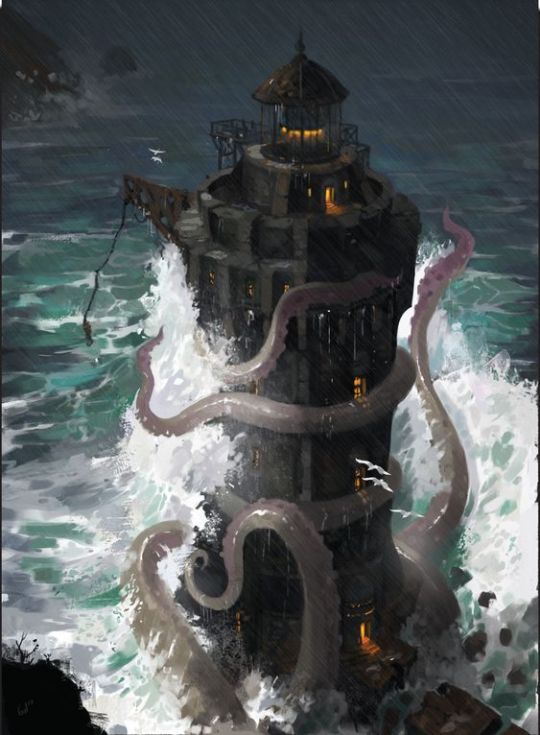
Adventure: Grasping for Answers
Throughout their early adventures the party come into conflict with the agents of the mysterious mage known only as "The Ravelling Hand", a villain of uncertain identity who seems to have lots of schemes and no qualms using violence, trickery, and unexpected magic to get what they want.
Adventure Hooks:
The party first become entangled with the hand's minions when they're asked by an innocuous travelling merchant to deliver a small wrapped parcel to the wizard living one town over. The wizard isn't open to receiving guests, and after sneaking or charming their way in, the party will find out why: her apprentice has been kidnapped, the parcel contains both of the boy's index fingers as well as a note explaining that she can have the rest of him back in exchange for several dangerous texts in her collection, delivered by the party to the same intermediary who hired them. A brawl is likely to ensue as the wizard suspects the party is in on the blackmail, but if they can talk her down maybe they can figure out a way to work together to get the boy back before any more harm comes to him.
Most thieves know better than to try and rob a magic item shop, but most thieves aren't armed with dispel magic infused salt grenades to neutralize the shop's ubiquitous defences. A rash of these attacks across the duchy has shopkeepers worried, and one hires the party to stake out their store for the night when they suspect someone is casing it. Do the party trail the robbers back to their hideout, or interrupt them mid heist only for combat to delay them long enough for those indiscriminate defences to start turning back on?
Spoiler Alert: The mage is in fact an arcanely gifted lesser kraken by the name of Dlexx who seeks to avail itself of all the magical knowledge amassed on land. Sure the deep has its own mysteries but there's a thriving trade in spellscrolls and arcane tomes that don't make it below the waves. Using an old lighthouse as a disguise for its massive form while on land, it uses telepathy and sendings to direct its minions without ever revealing its true nature. Imagine the party's surprise when they roll up to the villain's lair expecting to bully some crusty nerd with a ratty beard and instead the lair sprouts tentacles that drag them into the crashing surf.
Challenges & Consequences
Finding Dlexx is an adventure in and of itself. When questioned, most of the mage's minions admit to never having met their employer, and those high ranking enough to have been summoned to a place called "saltbite tower" in dreams only to later have their memories muddled. Careful interrogation and study of local maps will have the party realize that the tower is infact an abandoned lighthouse, which will narrow their search as they comb the costline for their enemy's lair.
Actually defeating the Ravelling Hand might prove too much for early level adventurers, as in addition to being a powerful mage the kraken is literally in its element, able to breathe and move while the heroes flounder. Dlexx will toy with them, throwing unconscious foes out of the water the way a fisherman throws back a catch that is too small. When the battle is over and it's proved it's point the kraken will collapse the tower and leave into the wide ocean, telepathically taunting them with their inability to follow.
Though the Ravelling Hand will not resurface for some time, the destruction of the tower and Dlexx's retreat into the deep is partially a bluff. The kraken chose that particular lighthouse because it was a short distance away from the coral reef into which it scribed its arcane learning the way a wizard records spells in a book, coiling arms etching formulae into hundreds of yards of living stone. Dlexx must periodically return to the reef to add spells to it, and sightings by locals (or the occasional fish manifesting with magical talent) might clue the party into the reef's existence.
A pair of merfolk siblings named Crashing-Tide and Arcing-Mirror serve the Ravelling Hand as apprentices and scribes, having promised seven years of utmost loyalty in exchange for the chance to bring the arcane knowledge of the surface back to their community. They tend to the reef, and allow the Kraken to borrow their eyes from afar so that it might study the spells scribed there. Several years into their pledge, Crash (the sister) has come to idolize Dlexx and the power it wields above and below the waves, wishing that the whole of their shoal to come into its service. Mirror (the brother) is skeptical, well aware of the kraken's manipulations and distantly suspicious of the conflict that it invokes. Perhaps if the party can intercede with these two they can learn more about their enemy's plans, though doing so will take some careful diplomacy.
Artist
#seaside#seaside villain#ocean#merfolk#arcane#wizard#rescue mission#low level#village encounter#town encounter
186 notes
·
View notes
Note
i am BEGGING you to make that jondami ship guide. not because i need anything to make me ship them more than i already do but because they deserve to have their good moments highlighted
Jondami/Damijon shipping guide.
A collective guide to any cute moment between Jon and Damian in DC comics or motion pictures. Any moment that could make a reader like them more as a ship will be put all here in one Tumblr post.
• Superman (2016) Issues #10-#11

This is the first time they meet each other and they immediately knock heads. Jon’s lighter than life personality clashes with Damian’s cold personality and they don’t seem to get along but you can tell there’s something growing behind the eye rolling and tongue clicking… a friendship?
• Super Sons (2017)
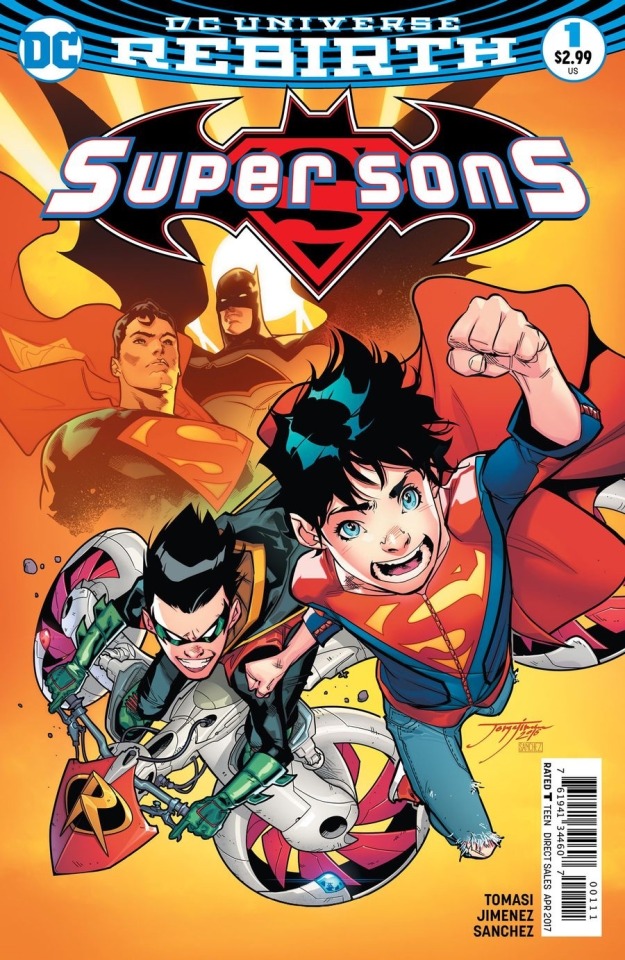
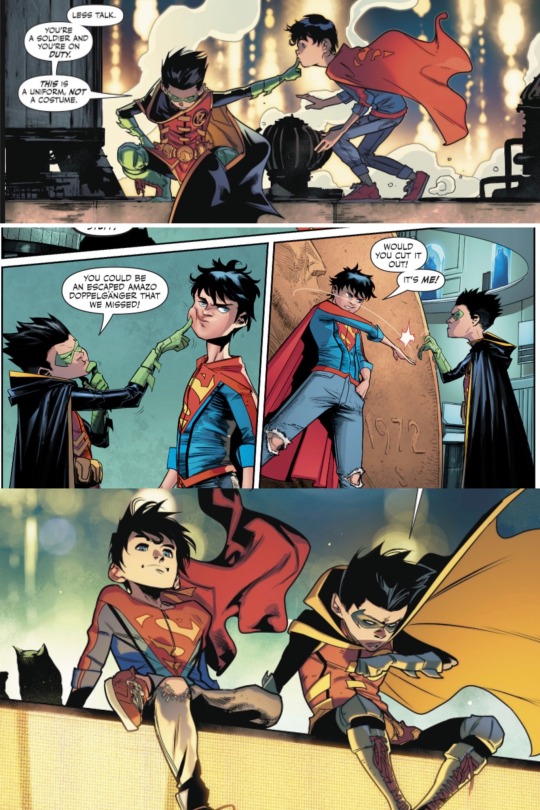
This is the first of the Super Sons series, the series is really short but gold nonetheless. No Super Sons comic that I don’t like but this one is my favorite. They still are knocking heads and refuse to call each other partners but they grow and learn to be heroes together.
• Adventures of the Super Sons (2018)
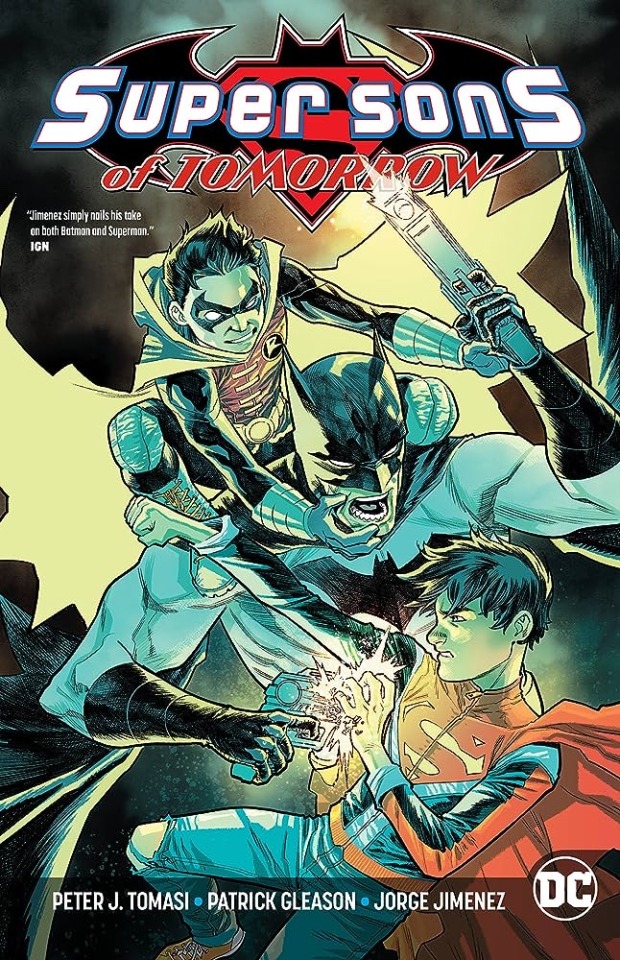
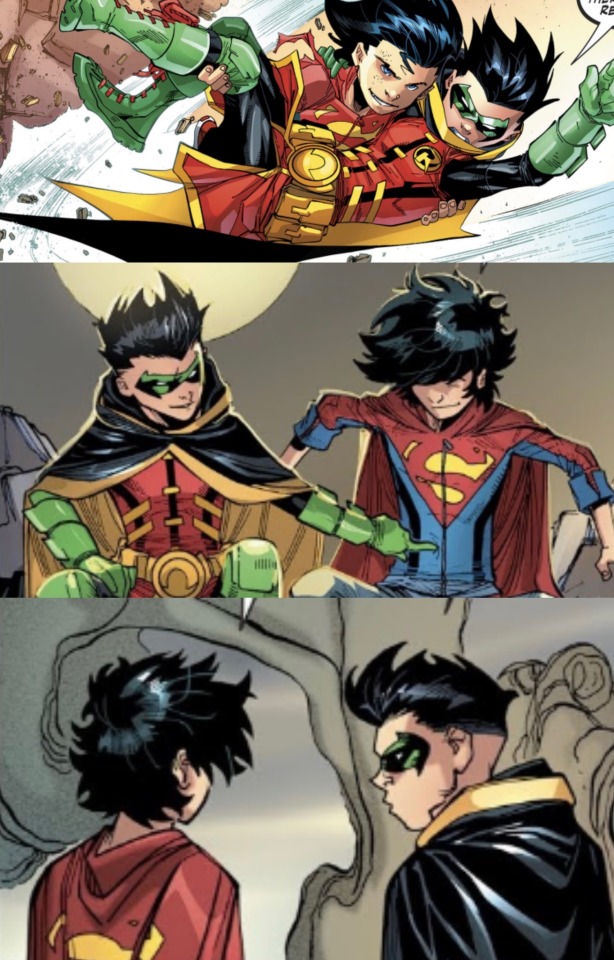
They slowly start to get used to each other and this comic shows that Damian isn’t just straight up mean but is starting to somewhat ‘like’ Jon.
• Challenge of the Super Sons (2020)
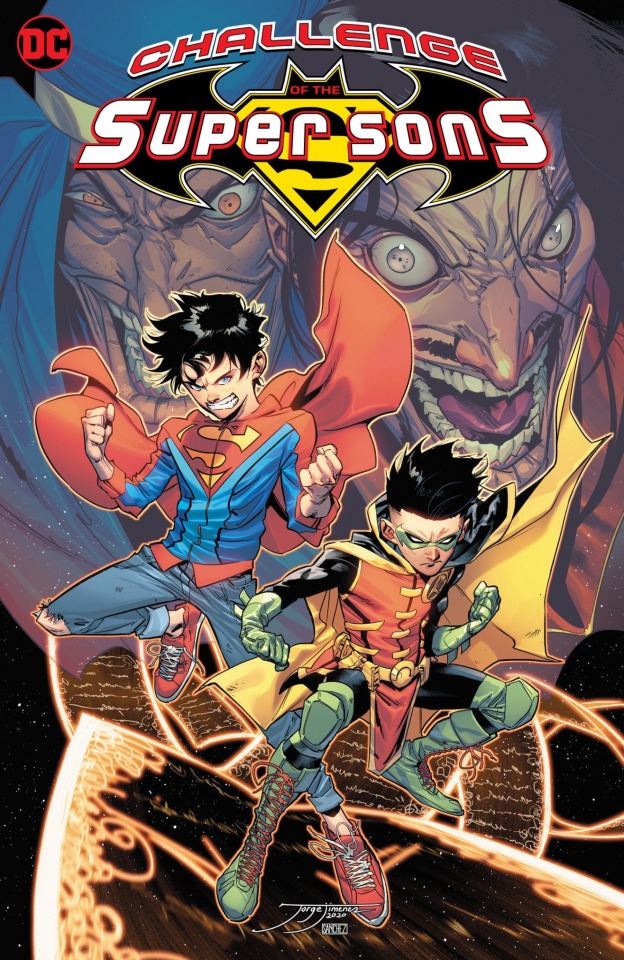
The last main Super Sons comics. This one is fine but I love the others so much. These comics are essential to know Jon and Damian period, it’s the main comics of each others story and in a way they are important to each others development.
• Batman and Superman: Battle of the Super Sons (2022)
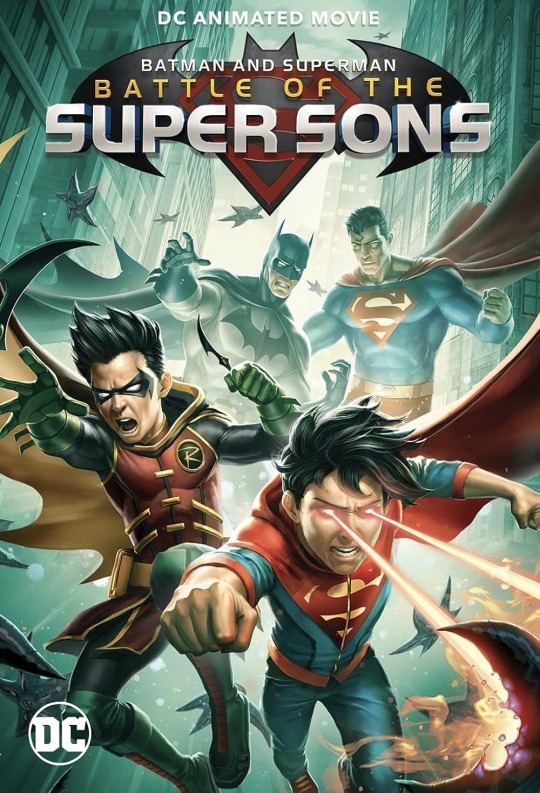

Now after all that reading treat yourself to a movie because Jon and Damian got their own movie. This is what started Jon and Damian for a lot of people and this is probably where a lot of you are from. This movie is great and fun. They made Damian wayyy nicer than in the comics and their friendship easier.
• DC Rebirth Holiday Special (2016)
Please find and read this. It’s so cute. I love it so much.
• Dark Nights: Metal issue #3 (2017 -2018)
They make a rock band in the beginning, its so cute.
• DCeased (2019)
• DCeased: The Unkillables (2020)
• DCeased: Hope at World’s End (2020)
• DCeased: Dead Planet (2020)
• DCeased: War of the Undead Gods (2022)
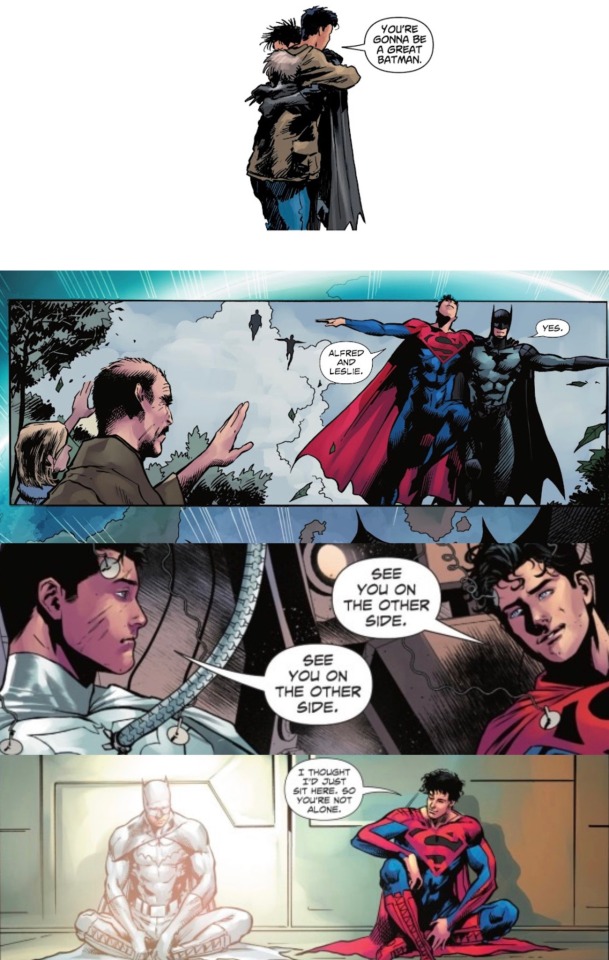
This is such a good series, and story in general please read it. DC peaked with this one and its so angsty. I don’t care what comphet was happening, Jon was there for Damian like no one else. I think Damian ends up with Cassie which is weird to me because Damian has never shown interest in anyone before but I excuse it since it’s not really gonna happen again since they were in a relationship just for the story to be more high stakes and sad. Jon and Damian’s relationship was at the forefront and for comic book readers DCeased made people see the potential in Jondami.
• DC’s Terror Through Time (2022)
This is so cute, please read this. It’s a halloween special and they switch uniforms <3!!
• DC Saved by the Belle Reve (2022)
They help a nonbinary person navigate school and it’s so damn cute.
• The age up incident.
(Disclaimer: You can pretend this never happens and I wouldn’t blame you for doing that.) A writer named Brain Micheal Bendis comes into the writers room for DC and ages up Jon in short. The story is that Superman goes missing (He travels to War World and gets stuck there) and Jor-El comes back to meet Jon and he takes him on a trip to explore space, then they get trapped in a wormhole, Jon gets stuck on Earth-3 and has to fight Ultraman. He’s stuck in a volcano for five or six years and becomes seventeen (we think) when he comes back. This was sad to me because it took away all the potential interactions for Jon and our ability to see him grow up, it was rushed and purposely so. Jon takes up the title of Superman somehow and starts to date some guy named “Jay Nakamura.”
• Superman: Son of Kal-El (2021) Issues: #1, #3, #6, #13, and #14.
He does get a boyfriend here and I think it’s amazing the fact he simply gets a boyfriend but no one really likes his bf so… and the are real reasons why Jay as a character is problematic BUT if you just don't want to see him with someone else than every time you see a pink haired twink, quickly skip.
• Super Sons (2017) Special
This is them reuniting after the age up and it shows how Damian reacts to it. I can’t actually find this and if anyone can please let me know where it is. I can only find bits and pieces of it scattered across the internet. All you need to know is that he doesn’t like the age up anymore than us since he says “I miss my friend.” which is really sad to me because the age up ultimately really hurts what people like about their dynamic as well as tarnish Jon’s character almost completely.
UPDATE: found it, it got attached to
• Dark Crisis (2022) till Issue #5
This is fine, after issue four Jon and Damian are not there anymore and if you read half the story just for jon and damian you might as well finish it.
• Green Lantern: Blackstars (2019) issue #2
They hug here. You’re welcome.
• Action Comics (2016) issue #1030
This is the best thing to come from the age up. This is so cute of them.
• Teen Titans (2016) Issue #45
i didnt really like this, im not gonna lie but it has some damian and jon interaction worth noting with jon being protective over damian.
• Flash (2016) Issue #797
jon defending damian. this is such a cute moment for them. jon talks damian up and says how hes the strongest person he knows and how hes misunderstood.
• Superman (2016) Issue #21
iconic damian and jon sleepover, so cute. so flipping cute. damians outfit is adorable.
• Legion of Super Heroes (2019) Issue #3, ?, ?
dont read this. its rlly bad but this is full of jon being the number one damian apologist, quality jondsmi moments over quantity. worth mentioning
• Wonder Woman (2023) #3, #4, #5, #6, ?
literally them raising a child together but their ages are a bit wonkey, i still dont personally know what age either of them are supposed to be there...
DC MEETS HANNA-BARBERA - Super Sons x Dynomutt
I’d say they aren’t exactly written right, well over all they are but their personalities are more relaxed and they care about each other a lot and will go out of their way to make sure the other is okay and protect them from danger, make them laugh etc, theres nothing wrong with this, its really cute but you can tell its not the typical jon and damian writers is all. I like it.
- Fandom
Artist that draw Jon and Damian:
(I don’t know any of these accounts intimately so if they’re problematic in any way than I am sorry in advance)
Sheiya Vlad
Pechaghtlecha
Corinthianrm0
Hobiiiebrown
spider-jaysart
arunneronthird
Twitter
Hokke
Gozer
@_1209E
YouTube
Justice Lords Animation
Japanese Animation
Super Sons Meme Animation
- Fanfics
Trust fall by Ididloveyou_once
Those Who Wait by InsaneTrollLogic
moving in stereo by TheResurrectionist
Reasons to Not Fall in Love by nanami
Growing Pains
These are fics I read and liked, I don’t have much. I don’t read a lot of Jondami fan fiction so I insist that you recommend your own fanfiction in the comments. (Don’t hate me for the self promo)
- Music (A silly lil playlist I made for them)
END

#jondami#damijon#damian wayne#damian al gul#jon kent#jonathan kent#superboy#dc comics#damian x jon#damian x jonathan#jon x damian#damijon fanfiction#damijon shipping guide#reading guide#super sons#robin#supersons#slash ships#battle of the super sons#dceased#damian and jon#challenge of the super sons#adventures of the super sons#batman and superman: battle of the super sons
378 notes
·
View notes
Note
WIBTA for using a trope against my DnD party?
Low stakes on this one. I am a DM running a DnD game. I am currently at a part in my game where, unbeknownst to the party, a powerful political figure is trying to cover up her own crime. She wants to pin it on her rival and will offer her help to the party to "investigate" the crime so that she can make sure they find evidence against her rival. Here is where I might be the asshole. There is a DnD convention where a DM will sometimes bring in a high powered NPC to basically hold the party's hand through an adventure to make sure the party succeeds. My group has a lot of genre savvy players so they are very aware of this convention, even if I haven't used it before. I plan to use this knowledge against them to make them think that this NPC is me trying to help them when it is actually an NPC using them to help cover up a crime. WIBTA if I do this?
TLDR - I want to use the DnD genre convention of an overpowered NPC that is there to help the party to mislead the party into helping the NPC cover up a crime and pin it on someone innocent.
What are these acronyms?
163 notes
·
View notes
Text
So, the thing about being damseled, Welsknight is rapidly realizing, is you don't really have to be a damsel to do it. Or have it done to you, that is. Being damseled isn't really a gender thing, like all the old knights tales would have him believe. He doesn't have to have long blonde hair, or a princess dress. He doesn't have to make deals with obscure fae gods or spirits, doesn't have to know how to weave golden thread. Heck, he doesn't even have to be locked in a tower. Damseling -- that is, the state of being a damsel in distress -- is a much broader scoped state of being. It's not so much a trope or a role, and more of... An essence. A vibe. If one can be trapped and helpless and in need of a knight in shining armor to save the day, one can in fact be damseled just fine without any of the key fairytale hallmarks.
How does Welsknight know all this? Well, because he's managed to damsel himself, of course.
Welsknight is trapped. He should have known better. Well? Should he have known better? Eh. Even if he should have, he definitely shouldn't have expected to. He's new to Vault Hunting.
Iskall and Stress made it sound so easy. Yeah! Just go find a vault, gear up, don't be afraid to run for your life. Nothing can go wrong if you're careful. Beware the curses and traps and tripwires. Don't eat anything growing on the walls. Fight. Survive. Win! They do it all the time, with their adventuring teams and alone. Whatever suits their fancy. Just don't anger the gods and do run screaming if something way beyond your skill level wanders into the room. Cowardice? Nonsense! Vaults aren't duels, they're thrills. Thrills that sometimes glean cool treasure, and treasure, while awesome, can't challenge your honor and isn't worth your life. So go, kill some monsters, have fun, run when you need to. It's low-high stakes, choose your own adventuring at its finest!
And Wels is a knight errant, alright? He's slain dragons. And withers. And, yes, rescued a few damsels. He's good at what he does. So when he and Iskall went for some drinks at a local tavern, and Welsknight whined that he was getting bored of escorting mining parties and killing oversized lizards for neglectful nobles, well, Iskall had smiled and pointed him to the Vaultlands. And Welsknight, bored and stupid in his boredom, had decided raiding vaults was a great idea.
"If I get out of this," Welsknight vows in his most solemn, oath-binding knight's voice, "I am going to punch Iskall right in his grinning, stupid face."
He is barricading a door with anything he can find, all while the screams and shrieks of some persistent undead challenge his fervor from the other side. The undead here are different than they are outside the Vaults. The slow, lumbering, hollow things that amble blindly around deep caves and unstable mines don't hold a candle to these creatures. These are malevolent undead, things that seem to hate Welsknight personally, inhabited by the dreams of sleeping gods that were, probably, sealed in these Vaults for a freaking reason. He's pretty sure one of them is jibbering with the voice of his dead brother, which is, honestly, demonic scales of unfairness. And he would know demonic unfairness. Welsknight has fought exactly one demon, and while he certainly isn't an expert, he knows more about how much they cheat and torment than he had ever wanted to know. And anyway, how is he supposed to kill that kind of malevolence in the undead? He's not! For heaven's sake, he's faced fae with less personal malevolence, and the fae court is the most petty place on earth!
Welsknight kicks his barricade with an armored boot, making sure it'll hold. The stack of pilfered detritus shakes but stands firm. Somewhere in that lot is his broken sword, barring the door shut. The blade shattered in four pieces when he was tackled by some wight-creature, not because the creature was that strong, but because he'd just used it to fight some sort of corrosive slime, and really, the fact that living acid slime exists in the Vaults is unfair, and something Iskall really should've warned him about. At least it hadn't gotten on his armor.
Welsknight backs away from the barred door, listening to the angry screams of what lay beyond it. There's a lot of name-calling going on. "Come to your death, coward!" And "Brother please! Help me! Don't let it take me!" And "Sleep with us forever knight! Aren't you tired?" Screech and groan through the air as though the door and barricade aren't there to muffle it. There's hysterical cackling as well, which is kind of typical. He can't tell if the loudness of the noise is supernatural, or if it means there's another entrance to the room he hasn't noticed yet. As unsettling as the supernatural option is, he kind of prefers that right now. Weaponless and exhausted, he's not sure how well he'll manage if the undead just start pouring in from a side door somewhere.
Welsknight blinks, and belatedly realizes he's blinking back tears. His hands shake as he wipes them away. Yeah, okay, maybe the screaming-with-the-voice-of-his-dead-brother thing was getting to him more than he thought it would. He's a knight, not an iron golem. He still has feelings. He tries to be detached and gentle about it. He knows what fear is. The first time he fought a dragon, he cried. He cried a lot, actually. After it was dead he lay on the ground sobbing for a good hour, which had been terribly inconvenient at the time, since it had broken one of his ribs. Terror kind of just, does that to him -- makes him cry. He learned a long time ago not to be ashamed of it, no matter how badly timed it could be.
"Right," Welsknight croaks into the room around him. "Cry about it later. Escape now."
It's not a big room that he's trapped himself in. It has the trappings of an ancient hall, with some newness to it, indicating he isn't the first adventurer to stumble in here. Rotting boxes and chests are tumbled against a collapsed wall, the smell of damp rot wafting off them. One has candles and two plates on it, someone's makeshift dining set up, and there's the scorched remains of a campfire. It looks pathetic compared to the massive columns and reliefs it sits beneath. Maybe this place was a temple? It sure seems kind of temple-y, but Welsknight has yet to encounter an altar to any Vault Gods -- which is probably good. Iskall had mentioned those were guarded by scary creatures, and if "malevolent undead who steal the voices of your loved ones from your memories to torment you while they devour your flesh" hadn't registered on Iskall's "scary creatures to warn Wels about" index, he really, really doesn't want to know what insane creatures might guard the altar chambers of the Vault Gods.
"Probably like, undulating tentacle demons with acid breath," Welsknight mutters out loud as he meanders the chamber, searching for something useful. "Or maybe the Gods themselves just come down and use you as a hackey sack until you prove your worth or die. That sounds about right."
The cold stone walls make no comment, which is probably for the best, since given current trends, they would probably talk back with the voice of his disapproving parents, or maybe the old knight he'd been squired to, which would really start straining his already stressed out psyche right about now.
He can still hear his brother's voice calling to him through the door.
For as impressive as the room is, there really isn't much in here of use. The boxes from the old expedition have let the moisture in the room in. There's old, indecipherable food inside that is now mostly black sludge. The candles might be useful if he had anything resembling a tinderbox to light them with. Everything else in here is far older, and mostly carved stone too heavy to pilfer. This place has obviously been picked over before. No relics are on the walls. The one chest he finds that is (probably) older than the boxes contains only a single glorious cobweb as a prize. Welsknight has just about submitted to his fate to die in obscurity in a random Vault somewhere, when he encounters a corpse. It is not reanimated dead, though he does give it a few good kicks to make sure it doesn't feel like crawling to life and talking with ominous voices.
"Well, at least the ambient necromancy going on in here has limits," Welsknight sighs, squatting down on the balls of his feet to pick the corpse over. "Well, friend, I don't suppose you've got anything helpful on you?"
Their chainmail is rusted, their features, save for a few whisps of black-brown hair, are decayed away. He manages to find a coin purse with some woefully old looking coins -- so the chances of some other adventuring party stumbling to his rescue are quite small then. He picks up a shield from them that, though dry rotted, looks like it could block one or two more hits before giving up the ghost. On their back is a scabbard so rusted, it looks like the sword might be fused inside. Welsknight grimaces, then shrugs and concedes that even a brittle sword is better than none. Still, it doesn't make prying the sword belt off the old bones any more pleasant. There's a lot of brittle cracking, and a lot of wincing on Welsknight's part, before he finally manages to get it free.
"Sorry friend, but I think I need this a little more than you do."
The skull rocks a bit on the floor as it settles, but otherwise doesn't seem to care. The sockets aren't even facing his direction. Welsknight takes that as his sign that he isn't horribly cursed... Or at least no more so than when he first got trapped in here. Welsknight rubs at the blade, trying to see how much of the rust is superficial. A bit chips off beneath his fingernail, revealing bright silver beneath.
"A silver scabbard?" Welsknight raised his eyebrows at the corpse, "Well, weren't you a glamorous fellow?"
Welsknight grimaces and, taking ahold of the hilt, draws the sword. It pulls a lot easier than he thought it would. The rust holds it for a moment, and then smoothly releases, revealing bright steel underneath. The sword unsheathes with a ringing hiss.
"--ON'T SHEATH THE SWORD YOU IDIOT!"
The scream is right by his ear. Welsknight lets out a startled yelp and turns to face the voice, tripping over his feet and landing in an inglorious heap on the floor.
Standing in front of him is a knight garbed in black armor, a fiery plume rippling from his helm. His back is facing Welsknight, and he stands with his shoulders hunched, one arm reaching forward like he's trying to stop someone. The knight takes a step back, surprised, then rocks on his heels.
"Oh." He says, then looks down at the skeleton by his feet. "Oh."
He stares at the skeleton for a long moment, shrugs, and then gives the skull a hard kick, sending it clattering off across the room. "Serves you right, you asshole!"
Welsknight is crying again. He can't help it. He's scared and overwhelmed, and this knight is so, so terribly familiar. From the armor to the way he stands, to his voice. And when the knight turns to face him finally, the face is familiar too.
"Hels?" Welsknight whispers.
Helsknight, his definitely-dead brother, looks down at him with uncomprehending eyes. Then he scowls, "Nope. Sorry."
"I-- but--"
"I am the Spirit of the Sword," Helsknight cuts him off, rolling his eyes petulantly. "I serve the wielder of my blade, loyal in death, as I wasn't in -- blablabla. I take the form of the protector, the guardian, the comforting, and yes, I'm used to the whole "oh you look just like my dead loved one" thing. So let's skip the unnecessary angst, okay?"
A particularly loud shriek from the ghouls outside echoes shrilly through the room before Welsknight can even attempt to gather his response. Helsknight spins to face the barred door and takes a threatening step towards it.
"Oh would you SHUT UP? We're in the middle of something!"
The sounds behind the door fall abruptly silent. Welsknight stares in bafflement, feeling just confused enough to stop crying. The Spirit Of The Sword That Looks Just Like His Dead Brother offers a hand to him.
"Come on, get up." He says as he pulls Welsknight to his feet roughly, and then gives him a long, appraising look. "Well, you look like you might know how to swing my sword, so there's something at least."
"I'm-- I'm a knight errant," Welsknight tells him, trying to recover some of his senses. "What-- are you another trick of this terrible place?" Anger starts to bubble underneath everything else he's feeling, and his fists clench. "I'm tired of the stupid mind games and the trickery, and everything screaming like Hels and---!"
Helsknight holds up his hands, looking something between annoyed and appeasing. "Aye, yes, I understand. My last wielder did die in this Vault. No I'm not a demon, or an evil spirit -- unless you intend to use my sword for evil, in which case, I'm evil by proxy." Helsknight ushered to himself. "The enchantment in the blade turns me into something you're familiar with. Whoever I am, I don't have his memories or his mannerisms--" his lip curls in something like disgust as he adjusts his breastplate, "--or his taste in armor. Really, what's wrong with some nice high mobility chainmail? Or leather? Leather is amazing! It's quiet and doesn't feel like I'm carrying a whole damn armory around."
Welsknight screwed his eyes shut and breathed. Alright. Alright. He's okay. He can deal with this. He can-- well at least he can ignore the specter of his brother following him around for as long as it takes to get out of this Vault. But when he gets out ohhh, oh Iskall owes him six pints at the nearest tavern and a damn good explanation.
"Sword Spirit," Welsknight asks after another set of calming breaths, "can you fight?"
Helsknight looks down at his hip where a sword is sheathed. He draws it, tests its weight and shrugs. "I'd be a poor sword spirit if I couldn't."
"Alright then," Welsknight picks up the magical sword from where he'd dropped it and walks towards the barred door. "Let's get out of here, then."
Well, there is one good thing about being damseled at least, Welsknight thinks bitterly as Helsknight begins moving the debris. Someone always sends you a knight in shining armor.
#the barking writer#welsknight#helsknight#swordheart au#sorry i couldnt resist this has been rotating in the back of my head ever since i read swordheart#hermitcraft fic#vault hunters fic#i know nothing about vault hunters except for like 10 eps of Iskalls singleplayer season 1 lets play please forgive me vh fans#helsmits
382 notes
·
View notes
Text
The Case of the Rose Tattoo
If you fancy a oozing-with-love-for-the-stories Sherlock Holmes point and click adventure and you don't want to wait a year or more for me to complete the Beekeeper's Picnic, might I suggest 30 year old obscure classic The Rose Tattoo?

I spent this evening playing around in this game and I'm in love, I think it's instantly become my favourite Sherlock Holmes game.
I've always thought that if I was writing a proper Sherlock Holmes mystery game, I would find some way for Holmes to be indisposed so that the player could play Watson acting in his stead, at least for part of the game. I feel like playing as Watson is so much more satisfying - he's able to be fallible, and we can join him in wanting to impress Holmes.
This game comes up with the BEST reason for Holmes to be out of action because it also sets the stakes very high - the Diogenes Club has gone up in flames and Mycroft is on death's door. Holmes immediately locks himself up in his bedroom in terrible grief, and it's up to Watson (and the player!) to pull him out of it by beginning to piece together what has actually happened.

The game uses actual actors in front of green screens for all the characters, which looks a little odd sometimes but it does mean they are expressive and grounded.
The voice acting generally seems good, although sometimes I think the quality of the dialogue surpases it. There is lovely a moment where Holmes laments that freak accidents seem awfully unreal until one happens to someone you know. His distress is palpable in his words, but not quite carried through to his voice.
The dialogue and expository text is aboslutely steller, though, so having voice acting to match is a tall order. It often has a very very dry sense of humour, and nails the 1890s parlance.
Also honestly I think I just love the Mycroft whump and Holmes being all 3 Garridebs about it. It's so personal!

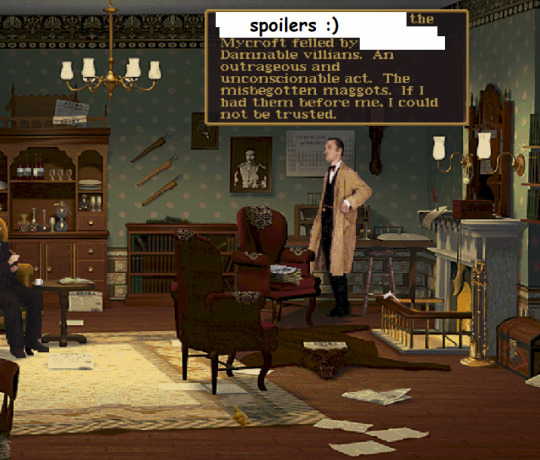
The caveat is that this is a game from the era when you were expected to sit down with a notebook, with no objectives or tutorials or prompts. It also seems to rely on you spotting very tiny details and doing a bit of pixel-hunting. I have a feeling that completing it would take a long time, and a lot of brain-power!
You can download it from Archive.org, and I recommend playing it with the ScummVM emulator.
#sherlock holmes#the rose tattoo#point and click#point and click games#sherlock holmes games#retro gaming#90s gaming
521 notes
·
View notes
Text
Is this a concept-formulation that's already kicking around out there somewhere? It might well be. It feels like the sort of thing that someone would already have developed. But it's new to me, at least, so I'll muddle around with it as best as I can.
On one end of the spectrum, you've got the musical hook. A hook is maybe two seconds of music, if that. And when you hear it, if it's good, you get a concentrated spike of -- oh, yeah, that's the shit right there, this exact experience in this exact moment is fucking awesome. And then, as soon as it's come, it's gone. All you can do is wait for it to come back later in the track, or rewind a few seconds, or maybe just replay that tiny little scrap of music in your head.
The pleasure of a good hook is incredibly condensed. It doesn't even really extend into the rest of the song, let alone into the rest of your life. To experience it, you have to be listening to those exact few bars (if only in your mind). It has no penumbra, no shades-of-experience that color other aspects of your existence. On the other hand, well...when you're listening to those exact few bars, you know it, and it's great. If it's a good enough hook, you kinda just want to listen to it over and over again, like you're popping Pringles or something.
All the way on the other end of the spectrum, you've got something like a traditional-style TTRPG campaign.
Even when it's being run masterfully, a game like D&D has a very low proportion of that's the shit right there moments, and a very high proportion of tedious yak-shaving stuff. Every so often you get your critical success in a high-stakes moment, every so often you get your awesome monologue or your big-drama scene or whatever...but for every moment like that, there's a hundred moments or more of the other stuff. The commonplace D&D play experience is famous for its vast amounts of OOC joking-around, which is not how things look when people are deeply engaged with the art on a moment-by-moment basis. And, of course, not every campaign is run masterfully. Sometimes boredom, or eye-rolling, is what you get in almost every moment.
And yet people love their D&D campaigns, like really incredibly a lot, and are deeply affected by them, and not-uncommonly have their whole lives changed by them.
The correct model here, I think, is that the pleasure generated by that kind of TTRPG experience is super diffuse. It's almost all penumbra. The awesomeness doesn't inhere in any one moment, or even any one scene or any one story arc. It inheres in the broad strokes of the campaign, in the ongoing knowledge that YOU ARE YOUR COOL CHARACTER and you go on a million cool adventures, in the mythos and the running jokes that add up invisibly over time into magic. And it pervades the entirety of your existence. You can think about it when you're lying in your bed, you can chat about it with your friends over lunch, and the awesomeness is just as much there as it is when you're actually playing. Maybe more so.
**********
Once you start looking at art through this variable-diffusion-of-appreciation lens, you can see many different points on the spectrum.
It's obvious that a short story is more concentrated than a novel, which is more concentrated than a series; it's obvious that a movie is more concentrated than a TV show. But it's not just the choice of medium that pushes in one direction or the other. It's a million different choices concerning content and style. Lushly descriptive language, in prose fiction, serves to concentrate the reader's appreciation into the moment of reading -- it forces the expenditure of extra attention for the sake of creating a beautiful mental moment, which in the vast majority of cases will be gone and forgotten almost instantly. Abstracted and philosophical language does the exact opposite, pulling the reader out of the narrative for a little bit for the sake of giving him something to roll around in his head. Suspense, and surprising plot developments, are concentration techniques that can have their full effect only during the transition from unspoiled-to-spoiled (and they serve to emphasize and heighten the moments of that transition). Archetypical, iconic plots are diffusion techniques that trade predictability-in-the-now for satisfaction-in-contemplating-the-story-later.
Sitcoms strike me as being vehicles for diffuse appreciation, to a huge extent, even more than other TV shows of comparable length etc. Much of what makes them good is just the presence of the characters and their distinctive shticks in your mindscape, in a way that builds from episode to episode without any particular grounding in specifics. When I think about a sitcom that I like, I find myself concluding that I like the show overall more than I like any single given episode. Which is weird, right? You'd expect some sort of bell-curve thing where the best episodes, or even the best individual moments, rise up above the averaged-out mass of the whole. But no.
**********
Fannishness is, overall, a very diffuse form of appreciation. This is true in the very-obvious sense that you're enjoying the work during a time when you're not actually consuming the work, by dint of consuming/producing fanworks and talking with other fans etc. But it's also true in the somewhat-less-obvious sense that the enjoyment-of-the-thing usually ends up very unrooted in the specifics of the thing, the plot beats and characterization details and so forth. You have a big beloved vibe, with lots of bits and bobs attached, and you can take the bits and bobs you like best and rearrange them however you like best when you're engaging in fandom.
**********
I believe it is overall true that concentrated appreciation is much more legible than diffuse appreciation. More legible to artists and art theorists, more legible to marketers and consumers. When you talk about art being good or bad or successful or unsuccessful, it's very easy to think in terms of "what is it like to consume this moment-by-moment?", and much harder to think in terms of "how does each piece of the work pervade the whole of the work, and also the general thoughtscape of the consumer?" For this reason, concentration techniques are associated with prestige, and high-prestige analysis tends to focus on a work's ability to generate concentrated appreciation.
...I also believe that different people want to be appreciating art, in the ideal case, at different levels of diffusion. There are people for whom a good artistic experience means lots of crack-hit awesome moments, and others for whom a good artistic experience means getting to live in an infinite penumbra, and others who fall at every point in between.
**********
For reasons I may discuss later, I think this concept-suite is extremely valent to the construction of theater LARPs, and the tension between people who expect more-concentrated enjoyment and people who expect more-diffuse enjoyment is responsible for a lot of the Wars Over What's Good within that sphere.
93 notes
·
View notes
Text
I’ve been seeing more posts along the lines of “dear god, please play a ttrpg other than d&d” lately, and I can get behind that, in the general sense that I’m anti-monopoly. I’ve also seen plenty of posts lamenting groups who extensively homebrew D&D or use house rules to get the experience they want rather than using another system that’s more specifically designed to deliver that experience. And again, that’s logical and not something I would argue with.
But in the midst of all this criticism for D&D, I just want to remind folks that there are a lot of things it does very well as a game, and if you’re consistently having a great time, there’s no reason to feel like you have to try new systems. Like, I’ve been playing some version of D&D/Pathfinder since 2000, and honestly I don’t really feel like I’ve been missing out. I’ve tried other TTRPGs occasionally, but so far Pathfinder has genuinely been my favorite and I always go back to it. And some of my most memorable campaigns have involved extensive homebrewing, but I feel like the core of what makes the game fun for me always shone through. Here are some things D&D is really good at that I personally don’t get tired of:
High action storytelling
Zero to hero adventuring where power advancement is itself a goal
Fun character building/customization that’s generally balanced
Empowering hero fantasy
High stakes drama
The dice significantly alter the outcome of events and no character is immune to failure
Having an extensive monster manual with a wide variety of fantastical opponents with their own lore
Having the rules as a referee for a large variety of situations
Long campaigns that bring you and your friends together for the same narrative over the course of months or even years
Tactical combat with a large variety of options and a robust enough rule-set to feel fair and skill based
A number of classes that cater to players with various preferences for flavor and complexity
Mechanics that encourage teamwork/cooperation
Mechanics that are largely separate from setting/lore, so you can use the premade settings if you want to, but you never need to
Having a large community to interact with outside of just your table
Probably a ton of other things that I’m forgetting
Like, there are a lot things D&D is genuinely bad at, and you should probably play a different game if that’s what you’re going for. But the things that it’s good at are really fun and awesome and I feel like I could play this game for the rest of my life and never exhaust the possibilities.
#basically I just really love D&D#Pathfinder is my favorite but I've had more fun with every version of D&D that I've played than with any other system#it delivers the experience that I want#D&D#Dnd#Pathfinder#Dare Original
691 notes
·
View notes
Note
Do you think Aoi will ever be able to show nene her “ugly” side and open up to her? Perhaps with the help of Akane? Or will she keep up her “popular girl” act with Nene to avoid the risk of losing her as a friend?
If we put the responsibility 100% on Aoi she will stay stuck in her popular persona forever. Aoi opening up is very important for change to be made, it is fundamental, but this friendship was built by two, and Aoi didn't get stuck in this superficial 'bubbly bff popular girl' image alone, Nene had just as much of a role keeping her in this box.
Nene lives in a fantasy and blinds herself to reality. Aoi is a big part of the idealistic high school life she desperately clings to, so even if Aoi tries to open up, Nene will either blind herself to Aoi's problems or go out of her way to shut Aoi down before the illusion is broken.
Even with the help of Akane I find it unlikely, cause 1- Akane knows this isn't his business, he let Aoi reunite with Nene alone and currently believes the two made up.
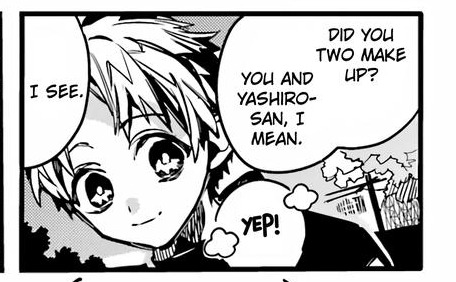
And number 2, even when people call Nene out directly, Nene does not change her behavior. If she doesn't want to think about something that distresses her, she will cover her eyes and not think about it. There is A LOT to talk about when it comes to this problem of hers, but I'll keep it brief, no need to go over the whole manga for this point.
Think about her dilemma with Hanako: She is always surprised when someone calls him a murderer, either making excuses for him or unable to reply, still not making a hint of progress untangling how she personally feels regarding his murder despite this being an internal conflict that was introduced at the very start of the manga.
Why does she not have an answer? Because she doesn't want to think about it. The idea of him murdering someone is troubling and scary and not a nice fantasy at all, she doesn't want to think about it. So she doesn't think about it. Is that simple.
Nene is no longer a normal girl. But she is in denial. She still wants to believe she is a normal girl.
We can say "A lot of 15 year olds girls live in a fantasy world and are boy crazy :D" but we can't say "A lot of 15 year old girls know they'll die in 1 year, have seen ghosts being broken and doomed, nearly lost their friend cause their crush got extreme in their attempts to help, had seen the eaten remains of a possible friend (sumire), but their priority is to confess to their crush." That's not normal. That's a Nene thing.
She is determined to stay the same even when the world around her begs her to change. Begs her to sit down and think about the reality she is facing.
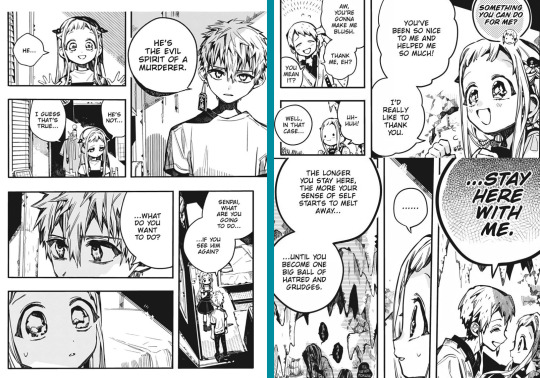
She is shocked when she sees bad things but she doesn't allow herself to process it. The manga itself calls her out for not learning from her mistakes.

She treats high-stakes scenarios as a normal high school life scenario. Fantasy may be one of Nene's charms but it is also her biggest flaw.
Nene has many moments where her reality is challenged, moments that feel like it will lead to introspection, but she never thinks about what she is told. what she sees. She doesn't want to stay mad at Hanako. She doesn't want to think about the situation. So she focuses on the no priority of "omg I need to make my crush confess!" as best she can.
Anything that is too serious or dark to fit her high school fantasy adventure will not be thought about. She is a kind person, there is no denial, but this incapability to face reality, to take off her bubbly fantasy glasses, makes her very insensitive at times.

She is so far up la la land that she hasn't properly processed that Hanako is dead yet.
She non ironically says "l'll live a happy life as a dead person" at the idea of being with Hanako. Aoi's rescue is a run away narrative in her mind, a forbidden romance. She is not in reality.
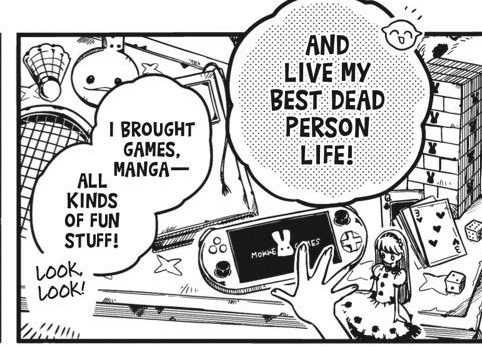
It is understandable to go in denial, to reject reality when reality is something you don't want to face, especially at 15, but just because it is understandable doesn't make her devoid of responsability. Nene is being a coward, her fantasies are far more charming than Aoi's brand of cowardness but she is, in her own way, still running away from her problems.
Even Hanako, who is madly in love with her, acknowledges she is self-centered and childish.
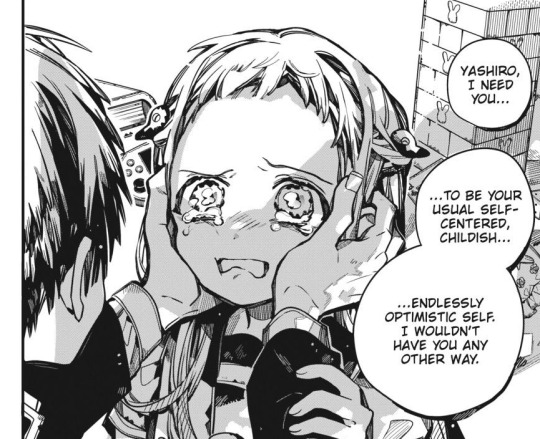
Aoi being a popular queen is the embodiment of her fantasy that "being popular is amazing! Is a dream come true"
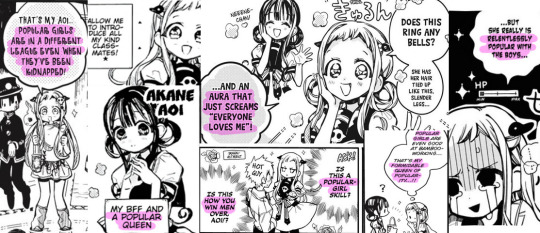
So if Aoi works on the courage to speak up, if Akane calls Nene out, but Nene doesn't work on her bad habit of ignoring reality for the sake of her high school dream life, she will keep turning a blind eye to every hint she had witnessed that being popular is not a sea of roses and Aoi have problems and flaws like everyone.
Aoi had tried to talk about her ugly sides before after all.

But Nene covered her eyes, dismissed the drugged Aoi she had seen as a complete fake and embracing her cute bubbly bff without asking any questions about her feelings, her behavior, etc.
She does not want Aoi to have flaws, so she won't see those flaws.
She won't change.
I talk in detail about how her fantasy problem affects her relationship with Aoi here
#i am assuming you already read the 'nene and aoi empty friendship' post anon but i linked it just to be safe yay#tbhk#yashiro nene#toilet bound hanako kun#jshk#jibaku shounen hanako kun#nene yashiro
101 notes
·
View notes
Note
having thoughts about your point that players/the gm shouldn’t have to design anything for a good ttrpg and wondering if i’m thinking of the gm’s role using inaccurate terms. what would you call the gm’s responses to uncertain mechanical situations in a given game (e.g. a mixed success in pbta - the onus is on the gm to come up with what that means, following some guidance from the rules.)
it seems like something that people find comforting about d&d is that even though the rules are overly complex (and often confusing), many of the common mechanics have clearcut (and boring) outcomes (such as save or suck, hit or miss, etc), meaning the gm doesn’t have to produce/interpret a result themselves. is the other approach (i.e. rules-light) putting more “design” weight on the gm? or is that thinking of it too formally?
otherwise, good design being the gm’s responsibility seems like it just falls under the umbrella of playing in good faith - whatever the situation, it’s bad faith to create untenable/insoluble scenarios that the players can’t meaningfully navigate
yeah, i mean--PBtA games have a list of GM moves, right? when a player has a mixed success, usually that means they succeed and the GM makes a GM move. and obviously those moves have choices and stuff the GM needs to come up with -- something like Monster of the Week's "Put someone in trouble" or "Separate them" definitely require the GM to think of how that works in the fiction -- but that isn't game design, right? the mechanical aspect of that has been handled by the game's rules text. so i think that if there's more weight on the GM i think it's strictly creative weight rather than design weight, unlike the 5e GM who is forced to mechanize anything they might want to make up and is often left without any mechanical guidance
and i mean, i think in general 5e (and dnd more broadly) give the GM absolutely fucking nothing to work with. there are literally no GM-facing mechanical levels other than enemy statblocks (which also, unlike something like Lancer or even fucking 4th Edition, come with no guidance on how to use them or how to assemble combat encounters with them). it's much, much easier to GM a game with GM moves, because then you have an actual set of mechanical levers available to you--and of course, like the aforementioned "Separate them", these levers automatically lend themselves to telling the sort of stories the game advertise for their genre. here's some GM moves from other PBtA systems that, just by seeing them as a mechanical lever, can push the story into the genre and tone directions the game wants to emulate:
Put innocents in danger (Masks, teenage superhero drama)
Reveal an unwelcome truth (Fellowship, high fantasy adventure)
Make honour and shame real (Sagas of the Icelanders, saga-era viking drama)
Bring their gender into it (Night Witches, Soviet airwomen war story)
Make them teach a class (Pigsmoke, magic-school cutthroat academia)
and one of the absolute best things about GM moves (and similar mechanics, like BitD's consequences, or BOB's setting sheet moves) is that because they are clearly delineated and restricted, there's no self-policing. because a dnd 5th edition DM can, rules as written, say at any point "100 ogres appear and beat you to death", they always have to be navigating a series of unspoken social contracts, creating threats but never threats which can win, introducing problems and consequences at a rate that keeps stakes up but is also fundamentally winnable, make everythign feel 'fair'. and dnd players have learned to accept this all as just the table stakes of a GM role, but it doesn't have to be. because all that is game design, and in a better game, that design is taken care of. GM moves say 'look, we've already thought about pacing and fairness, here's the levers we've pre-designed for you to pull, go nuts and tell a story with them'.
so in my opinion PBtA mixed successes represent a lot less onus on the GM to design the game for the designers than anything that happens in 5th edition outside of individual clearly resolvable combat actions--and it's one of the reasons i started having much more fun with TTRPGs once i stopped GMing 5e and realized that other games gave me actual tools and support to work with instead of expecting me to do all that bull shit
181 notes
·
View notes
Text
The New Kirby Novel Announcement might hint at the future of the series?
...or as I also would like to call it, yet another installment in the "Klu puts on a tinfoil hat in desperate attempts to predict Kirby's future" series.
So you might've already heard about the announcement of the upcoming Kirby Light Novel in the March of 2024. It's title is "The Dream Onsen is a Good Hot Spring" and If you aren't familiar with it's plot yet, here's the full synopsis:
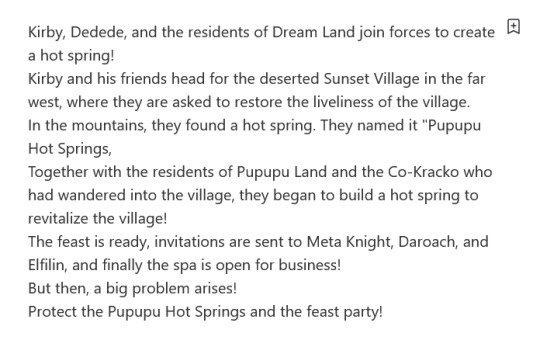
At first the story doesn't seem too remarkable, there are no promises for new high-stakes adventures on a different planet like in Dedede-focused novel "King Dedede's Great Escape Strategy" or shocking twists like in "Meta Knight and the Knight of Hades", but then it hits you. This novel will feature Elfilin and Daroach. A lot of people who learned of these news did instantly become excited, but not a lot of people seem to have realized just how bizarre this is.
If you aren't familiar too well with the novels in general, their utilization of the extended game cast is quite similar to the way mainline games handle them. As in, they rarely if ever appear if their names aren't "Kirby", "King Dedede", "Bandana Dee" or "Meta Knight". If novels could help it, they only use the main four and occasional recurring enemy/helper like Burning Leo or Chilly (and Chef Kawasaki as a bonus) as the supporting cast. And if the original story requires more important characters, instrumental in the narrative, Mie Takase, novels' author, tends to invent entirely new ones instead.
So far there were only 3 types of novels that primarily utilized game-exclusive characters. I myself sorted them out by type, this is not an official classification or anything. Here's a nifty chart:

Remixes, as I like to call them, are quote unquote "original stories" that feature game characters like Magolor, Taranza or Animal Buddies. But while most of the plot seems original, more often than not it seems as a re-imagining of the actual game plots. Kirby's Labyrinth Rescue is probably the most egregious example, as it's an unholy amalgamation of Return to Dream Land, Triple Deluxe, Rainbow Curse and Amazing Mirror. While a lot of the story might be original, they are "based" on something from the games instead of being wholly original narratives.
AUs are interesting, because they do tend to have entirely new stories that utilize game characters, but this is only with an asterisk that they take place in entirely different world from the main novels/game-adjacent canon.
Adaptations speak for themselves. They might have an original character or two (mostly early on in novels' existence) but they are mostly 1:1 faithful adaptations with some omissions and additions that don't significantly alter the narrative (with sole exception of Planet Robobot's novelization letting President Haltmann live for some reason). Notable thing is, that in case of certain game-adaptations, like Merry Magoland or Kirby Fighters 2, mentions/appearances of extended game cast are omitted or heavily limited (In KF2 novel Magolor and Gooey don't appear or get mentioned at all, in Merry Magoland only Gooey is mentioned among masks of the characters that don't appear in the story in flesh).
As you can see, this newly announced novel doesn't fall under ANY of these categories. It's a brand new, seemingly slice-of-life-esque story, that just so happens to randomly include Daroach and Elfilin. This is highly unusual because novels rarely if ever take risks or go out of their comfort zone. They kind of established the rules and formulas of how they work for years now and it's been working out for them. So why anything would change now?
Well. Heh... What if this sudden change in direction is actually reflective of franchise-wide changes? Shinya Kumazaki talked about how Forgotten Land is going to be the beginning for "the new phase of Kirby". So far it's hard to tell what he actually meant by this. But I would argue that one of the aspects that could be true in this new "phase" is more frequent utilization of the extended Kirby cast.
Novels, in terms of franchise-wide hierarchy, some of the closest things to the actual games in terms of importance, mainly thanks to how much of a juggernaut in terms of sales they are within Japan. Across 10 years of their existence they managed to sell over 3 million copies of all books, which might not sound that impressive, until you realize that these are books for children that until recently were purely Japanese-exclusive endeavor.
These books are the only adaptations, to our knowledge anyway, that get special privileges from HAL themselves in terms of telling some plot and lore details that even fans aren't aware of. Shinya Kumazaki even directly supervised and helped to write one of the books (Return to Dream Land's novelization that came out in 2022). It doesn't mean that novels are canon, but it does mean that they tend to reflect the current status-quo of the series better than most other aspects outside of the games.
So this sudden inclusion of ensemble cast in a random story might signify HAL's willingness to do more with these characters. Elfilin alone wouldn't have been perhaps that surprising, as he was hinted to have more importance past his debut in how he passionately expressed that he wants to stay by Kirby's side forever, but Daroach's inclusion is puzzling because while he did appear in multiple games, he didn't get any merch or notable appearances lately.
Of course, this might mean absolutely nothing! But I feel like this is more notable than most people give it credit for. At worst, this means nothing except that novels will utilize game cast more frequently, which would be cool, at best, it means that HAL is opening up to the idea of returning past characters more frequently, which would be awesome. Let's wait and see, I suppose.
108 notes
·
View notes
Note
Hiya! I started listening to the Lost Terminal because you mentioned it on here. I'm a few seasons in and really loving it. My friend is looking for some new narrative pods and I know you listen to a bunch. Got any suggestions? They can be finished or ongoing.
Oh do I!
Have a couple, in alphabetical order:
Absolutely No Adventures - An outright pratchettesque fantasy parody about a (very) Chosen One who has studied the art of baking instead heeding the call to adventure and refuses to go on any quests.
Care and Feeding of Werewolves - A (in-universe) podcast addressing current events and issues in the (American) paranormal community, hosted by a witch and medical practitioner. Has very good plot and worldbuilding.
Folxlore - Queer horror podcast set in Glasgow. Excellent show. "This apartment complex is very haunted, extremely cursed, and it sometimes randomly shifts to an eldritch nightmare realm.
Everyone here's queer though, including the building itself. 4 stars out of 5."
Gabriela & The Inn Between - A recent botany undergrad takes a job as Innkeeper at an inn with very strange and unusual guests. Cozy and low-stakes.
Gastronaut - Set a couple hundred years from now, a food journalist travels from Earth, then Mars, then a distant space colony. He's pathetic but in a good way. Excellent food descriptions, nice anti-capitalistic and anti-colonialist themes. Higher stakes and fewer steaks than expected.
Ghost Wax - I've always disagreed with the idea that necromancers are always evil. This show agrees - it's a horror podcast about an ancient necromancer solving supernatural murders by interviewing the victims. Very thrilling. Many feels.
Icarus Rising - Queer airship pirates! Stow-aways! Rebellion! Chases and Thrills! High-stakes drama and action among the clouds! An adorable ship cat!
Kalila Stormfire's Economical Magick Services - Very cool story about witches, fairies, werewolves, and more, a story about what makes a community, about modern-day working class neighborhoods, psychology, love, and of course magic.
Parkdale Haunt - This one I haven't listened to yet, but I've heard very good things about it. It's a horror show about a haunted house, set in Toronto, made with love for that city. Disregard this suggestion if you don't like Toronto, I've never been.
SCP: Find Us Alive - A podcast set in the SCP universe, about a site getting sucked into some sort of pocket dimension that keeps resetting in a sort of time loop. Very interesting cast of characters. Requires minimal knowledge about how the SCP Foundation works.
Starfall - Fantasy audio drama about the adventures of a theatre troupe that uses magical items and illusions in their work, and about a young warrior with mysterious powers who joins them.
Tell No Tales - Horror story about a company that specialises in removing ghosts from haunted places. The protagonist quickly becomes concerned about the ethics of that and tries to prove that they need to start treating spirits with the humanity they deserve.
The Antique Shop - Urban Fantasy drama about a student getting a job at the kind of antiques shop that you only find when you need to. Lots of cursed items. An excellent cat. Queerplatonic relationships.
The Mistholme Museum of Mystery, Morbidity, and Mortality - An AI audio tour guide shows you various interesting exhibits and learns how to be a person. There's lots of feelings here.
The Strange Case of Starship Iris - Sci-Fi story set in the aftermath of a war between Earth and extraterrestrials. It's about outer space, survival, espionage, resistance, identity, friendship, found family, romance, and secrets. The intro song is excellent.
The Tower - A young woman climbs an ancient, unfathomably tall tower from a forgotten age. It stretches up into the sky, through the smog and the clouds. Very vibes.
The White Vault - Travel Is Not Advised. Very scary story about what's been hiding below the ice and the stone. What's been slumbering for ages. What's now beginning to wake anew.
I hope this selection helps! I have more, but I felt it would be better to keep the list short-ish.
156 notes
·
View notes